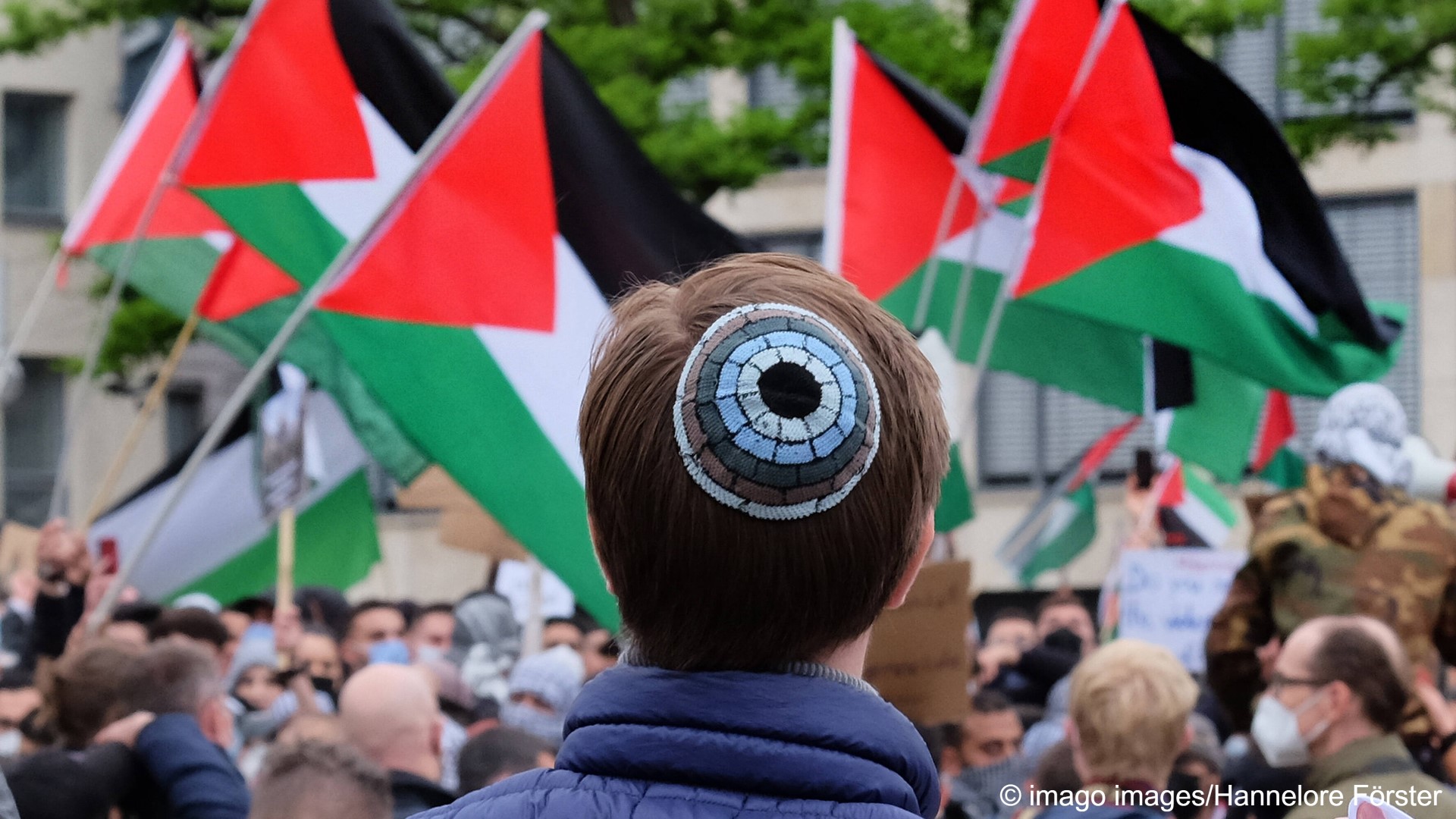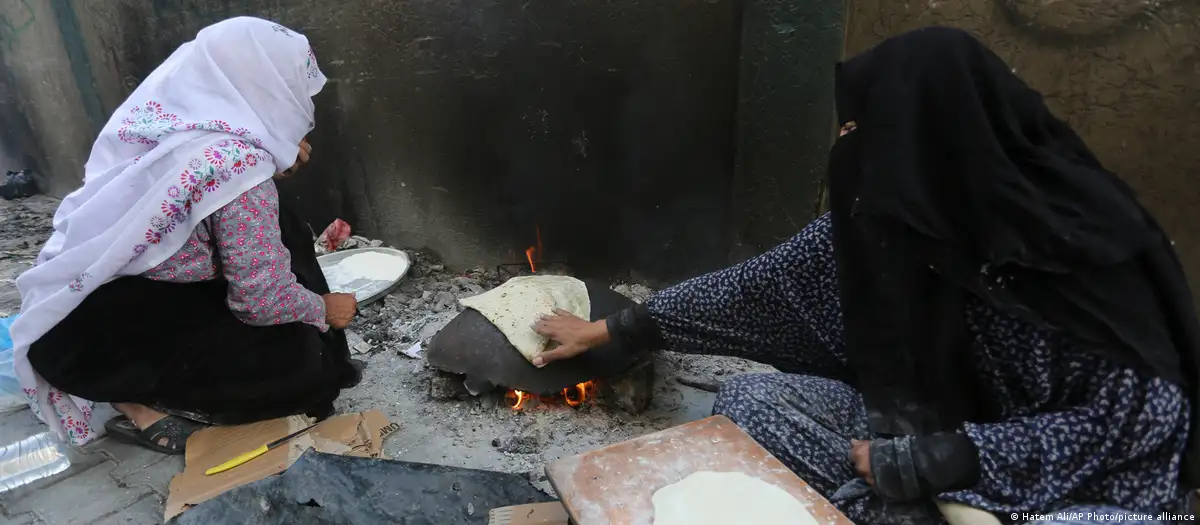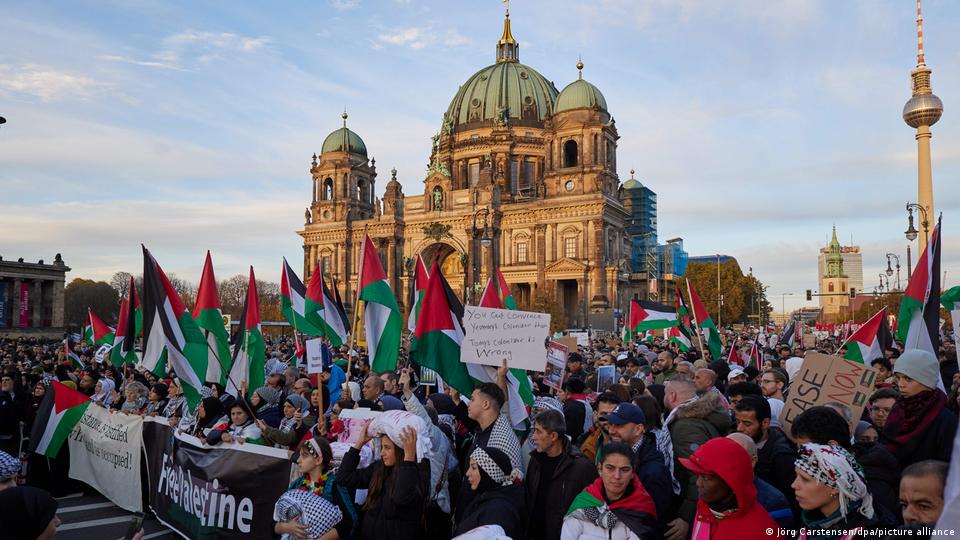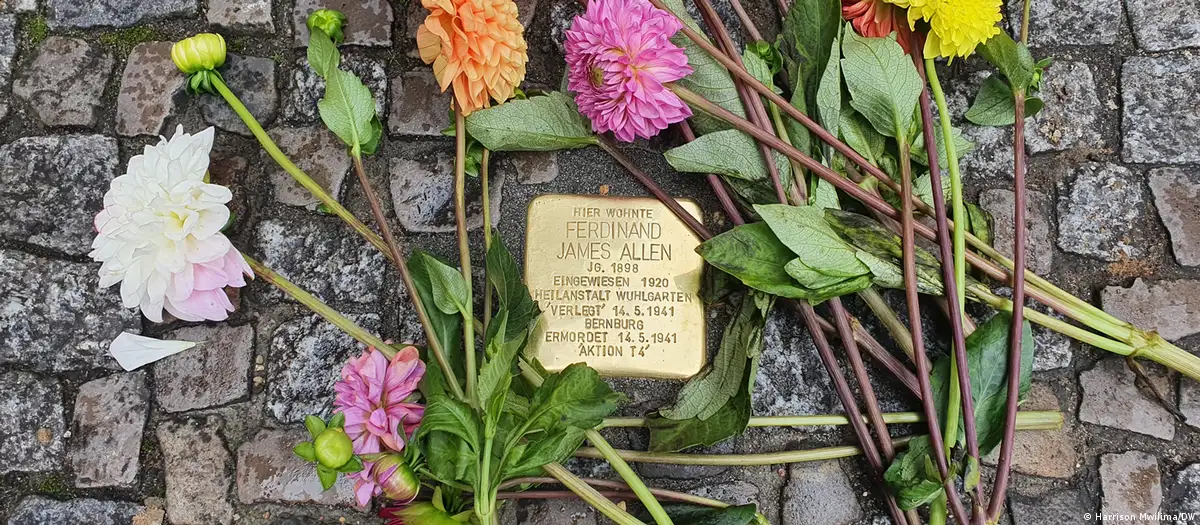In solidarity with the marginalised

Germany is divided. While thousands call for a ceasefire in Gaza and stand in solidarity with the Palestinians' suffering, the political elites are doggedly backing Israel and the war it is waging.
Following the horrific Hamas terror attacks on 7 October, they are unanimous in asserting Israel's right and duty to defend itself – at this moment when loyalties are being tested, Germany's place is firmly at Israel's side. Criticism of what the army is doing is batted aside with the argument that Israel is a democratic country operating under the rule of law.
But following more than 10,000 deaths in Gaza – two thirds of them women and children – the chancellor's words about the "very humanitarian principles” by which the democratic State of Israel is guided sound cynical to those with relatives caught up in the war. It is high time to start navigating this conflict with a compass of humanity.
This compass helps us to feel for all victims and to condemn violence against civilians on both sides – leaving aside both the fact that Hamas triggered the current war, and any questions about the proportionality of the Israeli response.
A lot of people in Germany – left wing and conservative, Muslims, Christians, Jews and atheists, immigrants and people of German heritage – would like to see more nuance, empathy and balance in this conflict that is so emotionally charged.

Focusing on the people
A broad social consensus is possible if we contextualise without relativising and turn the "yes, but" into a "yes".
The slaughter of Israeli citizens by members of Hamas on 7 October was not anti-colonial resistance; it was terrorism. And cutting off Gaza and its 2.3 million citizens is not self-defence; it is a violation of international law. Calling for hatred against Jews is hate speech. Criticising the Israeli occupation, and the displacement of and structural discrimination against the Palestinian population, is legitimate.
People who call for a ceasefire, wave Palestinian flags and cry out, "Free Palestine” are not automatically antisemites or supporters of Hamas. And people who wear a kippa or speak Hebrew are not responsible for the way the war is being fought in Gaza. What is clearly antisemitic are attacks on synagogues, stars of David painted on the walls of houses, and threats against Jewish institutions. Racism, antisemitism and Islamophobia can only be combatted together.
This last is desperately needed: the social fault lines run deep. If the crack is not to become an unbridgeable rift, we need to find our way back to a position that puts human beings at the centre of our thought and action. For that, we need to sharpen the concept of raison d'etat and make the culture of Holocaust remembrance broader and more inclusive.

Time for a refresher in humanity
It is possible to write about the Holocaust and the crimes of colonial powers without downplaying anything. In her latest book, Charlotte Wiedemann focuses on the numerous blind spots in our culture of commemoration. By Rene Wildangel
Criticism is also in the national interest
Israel's security is German raison d'etat – and there is much discussion about what that means in practice. In an emergency, do German soldiers have to go to Israel's defence? And are German politicians supposed to stand shoulder-to-shoulder with a government that contains racist and religious-extremist elements, without any ifs or buts? A clearer statement would focus on the people rather than the state: the security of the people in Israel is in Germany's national interest.
It follows from this that, if a majority of the Israeli population thinks that their government is not doing enough to guarantee their safety – because it is focused on staying in power and protecting radical settlers in the West Bank with the help of a questionable judicial reform – then we should stand in solidarity with the people of Israel, not their political leaders. Criticism is then not only permitted but necessary, in the spirit of raison d'etat.
On the issue of anti-Semitism, too, it helps to keep our minds on the individuals affected. German President Frank-Walter Steinmeier has warned that the protection of Jewish life is a function of state, "but it is also a civic duty". And Chancellor Olaf Scholz has called on the German people to show moral courage "for the protection of Jews".
Every person in Germany should feel a duty, then, to protect Jews – including immigrants. The crucial question is therefore how Palestinians living here can become allies in the fight against anti-Semitism.

No space for Palestinians
An initial step would be to make a clearer distinction between a political conflict being fought by two peoples in the Middle East, and religious hatred; between justified anger at Israel and indiscriminate attacks on Jews. Demanding that the descendants of displaced Palestinians show solidarity with Israel – a state they hold responsible for their families' suffering – is naive.
And how could we possibly do that at a time when the government of this country is conjuring the vision of a Jewish state where there is no place for Palestinians, and some of its representatives thus regard the ongoing subjugation and displacement of Palestinian residents as an appropriate strategy?
No, our focus must be on co-existence in Germany. Instead of making commitment to Israel's security part of the German citizenship test, and regarding any call for a free Palestine as grounds for rejection, we should be taking action against incitement to violence with the means at our disposal under the rule of law.
Jews, Muslims, Christians, people of all faiths and none, should also be encouraged to come together against extremist attacks. No matter whether these attacks come from radical Islamists, leftist haters of Israel, Germany or Islam, far-right AfD sympathisers or jihadist caliphate proponents.
The goal must be for decent people to close ranks against groups and parties that want to destroy peaceful coexistence in a pluralistic society.
Criticism of Israel too quickly classified as anti-Semitic
This differentiation also needs to be reflected in our culture of debate. Criticism of Israeli policies is too quickly classified as Israel-related anti-Semitism.
Debates about institutional discrimination against Palestinians, calls for boycotts as civil resistance, and the building of settlements – issues on which a multiplicity of voices argue passionately in Israel itself, in other European countries and in the USA – have fallen silent in Germany.
As a result, Palestinian-Germans feel powerless and invisible. If their anger tips over into anti-Jewish aggression, it becomes dangerous – not just for Jewish people, but also because extremists and hate-preachers use this sentiment for their own anti-democratic agenda.
The German foreign office's website rightly says, "It is a central component of Israel's security that we see the suffering of the Palestinians". But foreign minister Annalena Baerbock, who as part of her much-vaunted feminist foreign policy always points to the fate of women and children in conflicts, has voted against a ceasefire in Gaza.
Let us mark that red line more clearly: Israel-related anti-Semitism begins where the existence of the State of Israel is called into question; everything else can and must be debated. What remains is the commemoration of the Holocaust as part of Germany's efforts to come to terms with its past.
Against the backdrop of repressed and unprocessed emotions, the identification with the Jewish state is "a central element of German redemption", writes the author Charlotte Wiedemann in her book Den Schmerz der anderen begreifen (Understanding the pain of others).

Acknowledging the trauma of others
But remembrance is not a self-contained product; it is a process in constant flux, as Wiedemann says. Immigrants bring to it their own experiences of living under violent or foreign rule, persecution, war and being forced to flee their homelands. "Their trauma is added to the collective memory of a post-migrant society," she stresses.
Wiedemann argues that acknowledging this is the first step towards a dialogue about the mass-murder of the Jews. It is like every marital crisis, she says: only when my own pain is acknowledged can I open myself up to the other person's pain.
People have been investigating the ways in which migrants are changing Holocaust commemoration for many years – Malte Lehming gave an overview of the debate in an essay written in 2018. Little has changed in our culture of remembrance, however.
Although 27 January, the anniversary of the liberation of the Auschwitz-Birkenau concentration camp, was designated as International Holocaust Remembrance Day by the United Nations in 2005, and although migration researchers have long called for the Holocaust not to be understood as purely German history, we still expect immigrants to integrate themselves into our consensus of remembrance. If you live in Germany, you are supposed first and foremost to internalise German guilt.
Just acknowledging guilt for the Holocaust, however, makes no sense in a society that has seen so much immigration. Why should someone from Vietnam, Chile or Turkey living in Germany feel responsible for the German mass murder of six million Jews?
Why should a Syrian immigrant, whose land on the Golan Heights is still occupied by Israel, or a Palestinian whose great-grandparents were driven from their homes in the course of the State of Israel's establishment, support the security of that very state?
Understanding the Shoah
But all these people – a quarter of German society – are expected to recognise the necessity of an independent Jewish state as a result of the Holocaust. Can that be achieved? It certainly can. You don't need German heritage to understand the Shoah.
What you do need is a culture of commemoration that encompasses multiple perspectives, seeing the Holocaust not only from the German point of view, but admitting views from outside. In this way the Holocaust can be remembered as a crime against humanity, and migrants with no biographical connection to National Socialism can draw the same lessons from it as Germans with Nazi ancestors.
Young migrants and Muslims visiting Holocaust memorials frequently identify with the Jewish victims, according to sociologist Esra Ozyurek in an interview with ZEIT online. As members of a minority who experience exclusion and discrimination themselves, it's the obvious comparison, says Ozyurek.
Whether your personal approach to the issue is from the perspective of perpetrator, victim or uninvolved observer is not a crucial factor, the sociologist feels. In the end, what is important is a common acknowledgement.
Everyone needs to understand how a fascist society functions, how systematic marginalisation opens the door to violence, and that anyone can become a perpetrator, Ozyurek concludes.
The tragedy in Israel and Gaza shows once more that the effects of the Holocaust, a great crime in world history, are still being felt today. And for this reason, commemoration must take up the historical threads and keep spinning them.
What were its consequences in Germany? And in Palestine? How can we start a dialogue about events after 1948, which are viewed and recounted so differently in the Arab world to the story told in Israel and in Germany – a dialogue that ideally begins in school playgrounds and classrooms?
Savvy paedagogues such as Tobias Nolte and Gerhard Hanloser, both teachers in the Berlin district of Neukolln, know how to go about it – with relationship building and (self) reflection, recognition and respect for young people. They are aware of their students' own experiences of discrimination, have expertise on racism and anti-Semitism, and know that in this conflict, there are two sides with legitimate positions that must be heard.
Their students' biographical involvement in the subject is at once a challenge and an opportunity: thinking about the Middle East conflict shakes up certainties around identity on the one hand, while on the other, students can take a personal approach to the issue.
Nuanced project work including study trips to the Middle East, classroom visits from Palestinians and Israelis involved in the peace movement, and ideas for short-term de-escalation already exist. Instead of banning flags, why not spread out an Israeli and a Palestinian flag in a history or politics lesson and start a discussion about the feelings they each trigger?
This would get young people with or without any family history of migration talking about their biographical connections to Israel and Palestine. What have they been told by their parents or grandparents about the Second World War? What consequences did the Holocaust, or the Nakba, have for their own family history? A moderated exchange about experiences and perceptions – without directly apportioning any blame – could help to make this issue less taboo and more objective.
Ideally, listening will lead to understanding, and understanding to solidarity. Anyone with an anti-Semitic mindset will also be racist – this insight could help to turn marginalised people's anger, pain and fear into fellow-feeling.
Then German Muslims, Arab Christians and migrants with roots in the Middle East would not see Jews living here as perpetrators or enemies, but as people with similar experiences of exclusion and violence. Like the Syrian human rights lawyer who has been living in Berlin since 2015, and pauses at every memorial Stolperstein embedded in the pavement to read the names engraved on it, because the people deported under Nazi rule remind her of those who disappeared in Syria.
"We'll get through this together", said the banners – with an admirable degree of reflection – at a national solidarity congress of Jewish and Arab Israelis. If Muslims and Jews, Israelis and Palestinians can express solidarity in Israel, in the face of terrorism and war, then the same should be possible in Germany.
Kristin Helberg
© Qantara.de 2023
Translated from the German by Ruth Martin
This article first appeared in the German newspaper Tagesspiegel.

